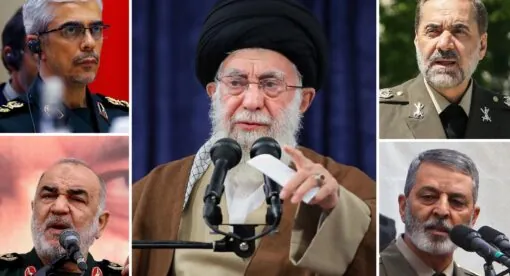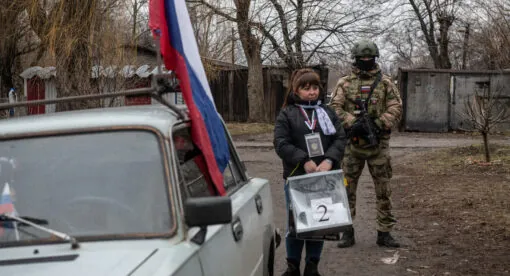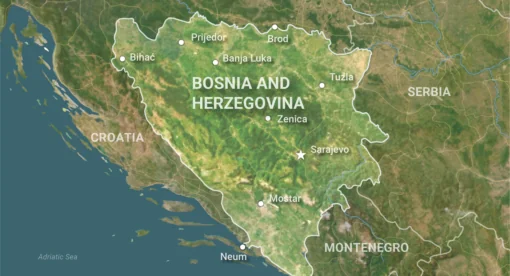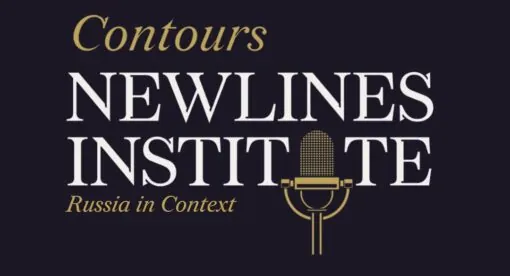In this episode of Contours, host Carolyn Moorman sits down with New Lines’ Non-Resident Fellow Tanya Domi and Balkans expert Jasmin Mujanovic to dive into how Hungary and Croatia are creating political instability and undermining NATO and EU goals for the Western Balkans.
Carolyn Moorman:
Hello, and welcome to the Contours Podcast by the New Lines Institute for Strategy and Policy.
This is the second episode in a series with contributors to New Lines’ recent report, Western Balkans 2023: Assessment of Internal Challenges and External Threats. This is the first product of the newly launched Balkans Observatory Initiative at New Lines.
In this episode, we’ll be diving into how two of the geopolitical conflict’s external actors play a role in the region with a contributor of this recent report and the report’s editor.
Our first guest is Tanya Domi. She’s an Adjunct Assistant Professor of International and Public Affairs at Columbia University’s School of International and Public Affairs and is an affiliate faculty member of the Harriman Institute, where she has taught in the Balkan studies program since 2008. Prior to her faculty appointment at Columbia, Tanya served in the US Army for 15 years and later worked as a congressional aide and military policy advisor to the late congressman Frank McCloskey.
She also worked internationally for more than a decade on issues related to democratic transitional developments, including media development, human rights, and human trafficking. She’s expanded her research to include genocide, conflict-related sexual violence, and prevention of atrocity crimes.
Also joining us is a contributor to the report, Jasmin Mujanovic. Jasmin is a political scientist and policy specialist of southeast European international affairs with a PhD from York University in Toronto. He has worked as a scholar, policy analyst, consultant, researcher, and writer in both North America and Europe. Presently, he’s an advisory board member of the Kulin Initiative, an advisory council member of the Nationhood Lab at Salve Regina University’s Pell Center for International Relations. His research concentrates primarily on the politics of contemporary southeastern Europe with a particular focus on the politics of the non-EU states of the Western Balkans.
Jasmin and Tanya, thank you so much for joining me today. I’d like to frame this episode with, centering in on, as I said, two of the external non-Balkan countries that are playing a role in this conflict, in this situation that we have here today, which is Croatia and Hungary.
So Jasmin, I’d like to start with you. Can you describe for me how Croatia, as a NATO and EU member state, how it is working in the Western Balkans to undermine the goals of both of these Western organizations and why it’s being involved in the first place, specifically in Bosnia and Herzegovina, as you describe in your section of the report?
Jasmin Mujanovic:
Right. Obviously, Croatia’s engagement in Bosnia and Herzegovina goes all the way back to the 1990s, because it was a direct combatant in the Bosnian war. And as such, it also became a signatory of the Dayton Peace Accords, which brought to an end the Bosnian War, which was the deadliest, most destructive of all of the Yugoslav conflicts between 1991 and 1999. Or 2001, if we want to go into the conflict in Macedonia.
Thereafter, Croatia takes a relatively moderate line towards Bosnia, in particular after the death of its president, Franjo Tudman. Croatia sort of positions itself as the best pupil of the EU and NATO. It’s jumping through all the right hoops. It’s engaging in all the necessary reform efforts to bring the country first into NATO and then eventually into the EU in 2013. Basically on the eve of its accession to the European Union, Croatia ends up arresting its Prime Minister, Ivo Sanader, under various corruption charges. So it’s engaging in all the right behaviors.
After 2013, however, you start seeing a fairly dramatic, shall we say, retrenchment of right-wing nationalist politics in Croatia. And without getting lost into the weeds, by the time you get into the middle of the decade and you see the return to power in Croatia of the nationalist HDZ Party of Franjo Tudman under the leadership of Andrej Plenkovic, who’s the current prime minister, Croatia is once again completely consumed with the question of Bosnia-Herzegovina, and specifically the status of the Croat community in Bosnia-Herzegovina.
And Croatia’s primary focus from that point on becomes the retrenchment of sectarianism in Bosnia-Herzegovina, specifically through the country’s sort of institutional order and what Croatia refers to as electoral reform. And it’s not electoral reform in the sense that, perhaps, you and I might understand it in the United States or in a place like Germany or Canada, but electoral reform for Croatia in the context of Bosnia-Herzegovina means, again, this really deeply, deeply illiberal sectarian model of governance that is not just about ethnic power-sharing, but also fundamentally about limiting opportunities for democratic accountability for citizens of Bosnia who do not belong to any of these main ethnic groups in the country, the Bosniaks, Serbs, and Croats.
Carolyn Moorman:
So you mentioned how more right-wing elements of the Croatian government have been trying to make a liberal electoral change happen in Bosnia and Herzegovina, and in your paper you discussed how the Croatian president in April of last year, after the Russian invasion of Ukraine, publicly stated that Croatia would not accept Sweden and Finland as NATO members until Bosnia changed its election laws. Can you dive into what exactly was said here?
And also, in this part of the paper where you discuss this move, you also talk about how Kurt Bassuener, who was, of course, a guest on our previous episode that centered on the Balkans, how he made remarks about the way this move turned out to the UK Foreign Affairs Committee in January. And in your part of the paper, you also talk about how these remarks are centered and if you agree with them. So I’m wondering if you could dive into this a little bit for the listeners.
Jasmin Mujanovic:
Sure. So basically, the situation was that the president of Croatia, Zoran Milanovic, said publicly on numerous occasions that after Sweden and Finland had put in applications for NATO membership, that Croatia should take the position of blocking their membership in the alliance up until such time as appropriate electoral reforms took place in Bosnia-Herzegovina, which is not a NATO member state or an EU member state, and that should be the formal position of Zagreb.
Now, the interesting thing is that Milanovic himself, as president of the Republic of Croatia, does not have the constitutional authorities to block Croatia from admitting or rather pledging its support to admit Finland and Sweden into the alliance. And publicly, the Prime Minister, and that is the government of Croatia, said they opposed Milanovic’s position.
But what Dr. Bassuener alluded to is the fact that I think among most experts, myself included, and analysts, the widespread belief was, through our own conversations with relevant policymakers in Europe and the West, was that the Plenkovic government had actually signaled something very similar to the allies in NATO and said that basically for Croatia, electoral reform, as they understood it in Bosnia-Herzegovina was the ask that they had in terms of actually allowing Sweden and Finland to join the alliance.
And sure enough, in October of that year, on the night of the elections in Bosnia-Herzegovina, the high representative, a former German parliamentarian by the name of Christian Schmidt, who has these very, very expansive fiat powers under the Dayton Peace Agreement, unilaterally amends the constitutional electoral law of the federation entity of Bosnia-Herzegovina, which is what Croatia was primarily concerned about, almost entirely in line with Croatia’s demands and the demands of their mainline Croat nationalist allies in Bosnia-Herzegovina. Schmidt himself is widely seen to be very, very close to Zagreb.
And so, it’s this rather shocking moment in Bosnia-Herzegovina’s postwar governance where Croatia has, in the interim, pledged its support to Sweden and Finland’s NATO candidacy. And it appears that what they had asked, publicly or otherwise, in return, they ultimately do get in October of 2022.
Tanya Domi:
I just want to say that Jasmin has really made the case here on these two malign actors in a way that we’ve never seen before in print. I’m going to say that. I’m very proud that we published this incredibly astute essay by Jasmin. And let me just really quickly add to the move by Schmidt. Not only was it outrageous, but it actually fundamentally violated EU protocols with regard to the Venice Commission. And the United States backed this move as well and openly endorsed it afterwards and bypassed the Venice Commission, which sets the standards for elections. And as Jasmin has indicated, he changed the Constitution, but he also violated and went around the standard practices of the EU itself to make this advance in political bargain.
Carolyn Moorman:
I mean, we see this rise of far-right politics happening all over the world. And Jasmin, you talk about this in your essay, but we’ve seen Hungary entrench itself into this conflict by supporting the secessionist tendencies of Republika Srpska.
Tanya, I’m wondering if you could go into detail about what is Hungary’s government getting out of this? What are they trying to achieve in supporting Republika Srpska in this situation?
Tanya Domi:
With regard to Orban’s government, Jasmin really lays this out very well, but Mr. Orban, like many autocrats, cultivated these relationships. He flew into Banja Luka in 2021 to support Dodik with a photo op. But not only did he do that, after Dodik was sanctioned by the United States and was followed by the UK, Mr. Orban warned that Hungary would block any EU moves to sanction the president at that time, one of the member presidencies of Bosnia. And would not only block any of those attemps, but he also provided a hundred million euros of assistance to the Serb entity. No doubt that money came from the EU.
We’re talking about, there’s a brazen overture and embrace from Budapest to Banja Luka. And as we see everywhere, and in the Western Balkans it’s more than obvious, that all the bad guys are all working together. And that’s just the way it is now, to support. And more or less, Orban has created his client. He has a client in the RS that he’s cultivated quite well and has basically used the platform in Budapest to say, “Not only is he my friend and I’m going to take care of the RS, I’m going to protect him from any encroachment by the European Union.” So it’s more than obvious what’s happening.
I also want to just add very quickly something that a colleague of mine, Maria [Shikas 00:11:09] has brought to my attention is that Orban’s oligarchs are buying up media outlets and establishing media outlets throughout the Balkans. Vojvodina, which is the former province in Northern Serbia, which is Hungarian population-dominated, has many Hungarian media outlets. Also in North Macedonia.
And there’s rumors right now, it’s been quite prominent, that N1, which is the CNN affiliate in the Balkans, is potentially going to be bought out by the Hungarians. So that would be a terrible blow in the Balkans, because it’s probably one of the best independent television networks in the region. So I’ll just leave my comments there.
Carolyn Moorman:
Absolutely. And you mentioned that Budapest has a clientele now in the Western Balkans and that all of these bad guys are working together. And Jasmin also mentioned in his part of the report that there seems to be this murky trilateral relationship developing between these bad actors. And so I’m wondering, how does this dynamic affect the Western Balkans, and what are these actors getting out of that relationship?
Tanya Domi:
Well, I think we always talk about the centrifugal dynamics of the Balkans itself. Now you have, I mean, Croatia is in the Balkans. It just happens to be an EU member, NATO member, which is really quite problematic given the tilt of politics in Zagreb. But this tilt is in Budapest, and it’s also out of Moscow. And Moscow also has a major client in Belgrade, and also there are actors internal to Bosnia and Herzegovina, Dragan Covic, which Jasmin previously mentioned, who’s no longer holding political office. But Dragan Covic and Milorad Dodik went to Jerusalem of all places last year, working together to get some assistance from right-wing Israelis on the electoral law, believe it or not, the electoral law plan that was carried out by the high representative.
So not only is that all troubling, it multiplies and builds on itself and creates these really, you would call, toxic relationships that are very bent on anti-democracy, illiberalism at its worst, working with the most nationalistic surrogates. So this isn’t good. This won’t contribute or advance democracy in any way. It will diminish it. Not only diminish it, but it’ll also sideline rule of law and the basics of liberal societies that we all want to see take place but is being buttressed at every turn. At every turn.
Carolyn Moorman:
It is being butchered at every turn. And like, Tanya, you and Kurt were talking about in the last episode, the US has really fallen off the mark in being engaged in this region and putting its foot down along with the EU. And so Jasmin, in this last episode, Tanya ended the episode by giving us a pretty dark, if I can say, outlook on how the US presidential elections next year will probably affect this region, whether if we see another Biden administration, another Trump administration, potentially another Republican administration. Do you have any different of a outlook, potentially, that is a little better, or do you see just the chance for this to be exacerbated, everything we’ve discussed going forward in the Western Balkans?
Jasmin Mujanovic:
So I think it’s unfortunate that we’re having this conversation this week where we’ve seen these killings of a Kosovo police officer by heavily armed Serb nationalist militants. It’s the most serious security incident in the region in easily more than a decade. And the implications truly are regional because, I mean, I think this has sent very much a chill down everyone’s spine in Bosnia and certainly among [inaudible 00:15:14].
It’s such a poor reflection on the Biden administration, who, when they came into office, President Biden as senator in the 1990s was really one of the champions of a much more forthright, a much more credible approach to the wars in Bosnia, to the wars in Croatia. Also during the Kosovo War, Senator Biden was really a champion during the nineties. He was referred to as a Bosnia hawk among with people like Frank McCloskey and others.
So Biden comes into office as president in 2020, and there is the belief in large parts of the Western Balkans, including in Bosnia and Kosovo, that this is going to be a historic opportunity, because here is a president who deeply understands the region, has traveled to it many times, was so deeply involved in the events of the 1990s, was seemingly on the right side of history. And I think it has made the disappointment of what the Biden administration has done in practice so much worse, because it isn’t just Biden, of course, who’s a pretty seasoned Balkan hand himself. There are people in the National Security Council, there are people at the State Department, who have really made their diplomatic and political careers in one way or another working on the Balkans, including people like Samantha Power, for instance, who comes into the American imagination really as a result of her writing on the Balkans and a few other places in the context of her famed book, A Problem from Hell.
And so for Bosnian Americans for instance, or Kosovar Americans, or even Montenegrin Americans, who are all overwhelmingly democratic voters, this period of this past three or four years has been, I think, really, really chilling, really, really disappointing. And that’s not to say at all that they are now suddenly inclined to vote for a future Republican administration because I think they’re deeply aware that, for instance, a future Trump presidency would also be even more catastrophic.
Because then you’re going to have people like Rick Grinnell coming into office, Grinnell, who’s widely understood basically to be a Serbian lobbyist at this point. I mean, a truly extraordinary kind of relationship that he seems to have with Belgrade. The Serbian government has made also aggressive overtures towards the Trump family themselves. So it’s not at all to suggest the GOP presidency, at least the Trump presidency, would be better for the region.
But unfortunately, given what we’re seeing on the ground right now, the Trump presidency has been deeply disappointing and has realistically contributed, unfortunately, to a significant political insecurity degradation in the region, in Bosnia, in Kosovo. So unless we see very, very significant staffing changes, personnel change in a second Biden administration, and a really, really serious reinvestigation of its regional policy, I’m very, very fearful of where we are will be, even with another Biden presidency, four years down the road.
Tanya Domi:
I just want to add, I agree with Jasmin. And the opportunity to reset by a new German government came and went, and Schmidt is an example of the German approach right now. But let us not forget that Viktor Orban changed the Constitution the first year when he took office, and he changed and amended the Constitution with respect to press freedom. Secondly, he was producing German cars, and Angela Merkel negotiated with him. And so she played a role here, too.
She negotiated with him, and in the pick, Germany did nothing to advance Bosnia’s democracy, help it stand up, help it move forward. So you’ve got really both ends of the Western democracies failing with respect to Bosnia and Herzegovina and, as Jasmin has just pointed out, the terrible events over the weekend in Kosovo, which should be a warning to all of us about the security posture of the West and what they’re not doing in the Balkans right now.
Carolyn Moorman:
And I think it only makes the work of Jasmin and yourself, Tanya, more important in the newly launched Western Balkans Observatory that New Lines has produced. This work is incredibly vital to making this region more pronounced in the US policymaking space in DC.
I thank you both for coming on the podcast today. This has been a wonderful episode.
To our listeners, thank you so much for listening to this episode of Contours. Make sure to subscribe to the podcast on SoundCloud, iTunes, and anywhere else you listen to your podcasts. You can make sure to check out further analysis into the Western Balkans Observatory and to all the other amazing products New Lines releases at www.newlinesinstitute.org.
All the best.








